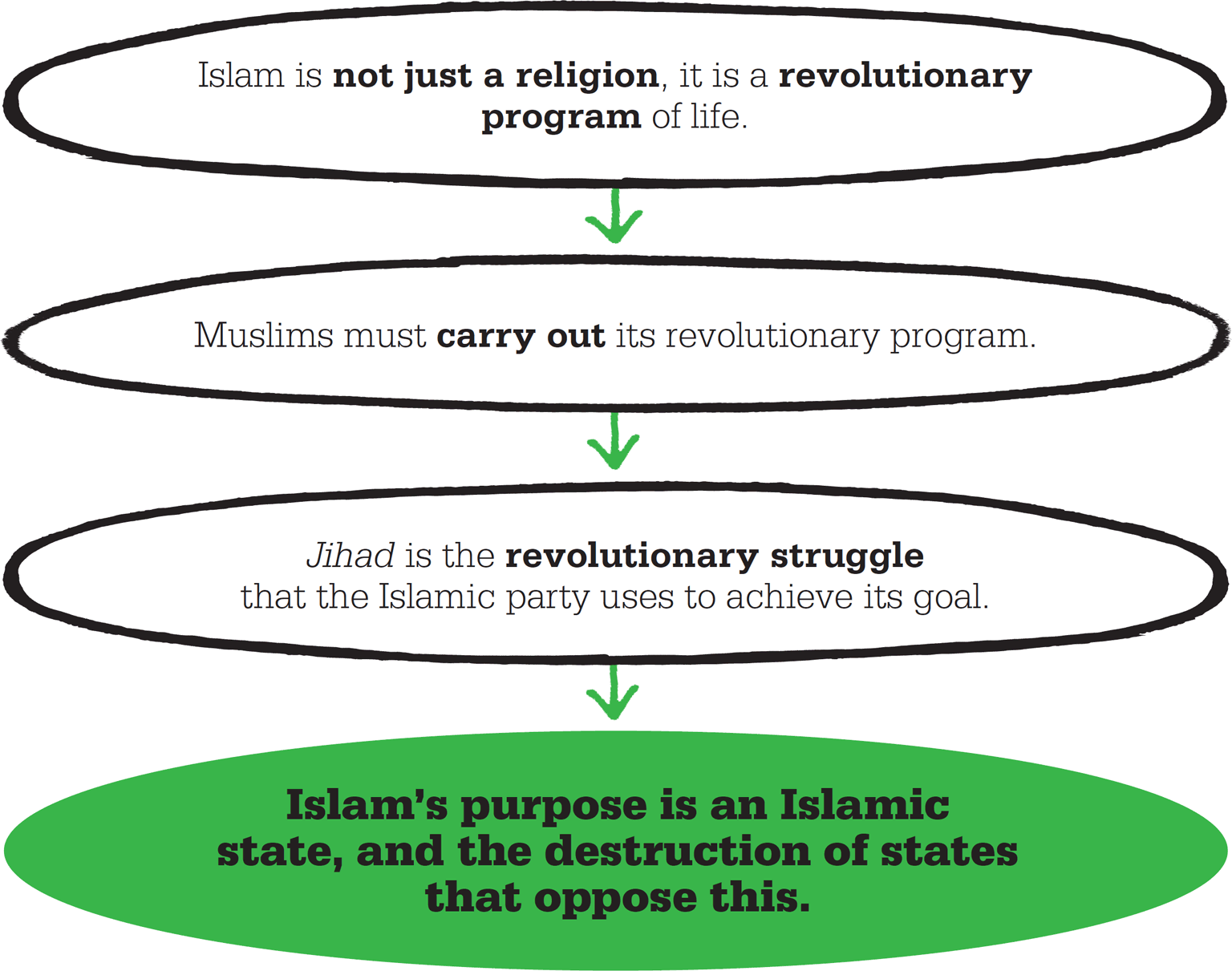
IN CONTEXT
Islamic fundamentalism
Jihad
622–632 CE The first Muslim commonwealth, in Medina under Muhammad, unites separate tribes under the umbrella of faith.
1906 The All-India Muslim League is founded by Aga Khan III.
1979 In Pakistan, General Zia ul-Haq puts some of Maududi’s ideas into practice as Islamic Sharia-based criminal punishments become law.
1988 Osama bin Laden forms al-Qaeda, calling for a global jihad and the imposition of Sharia law across the world.
1990 The Cairo Declaration on Human Rights in Islam cites Sharia law as its sole source.
The genesis of the global Islamic revival in the 20th century has often been traced to the rejection of European colonialism and Western decadence in Africa and Asia. However, it was also linked to internal issues of communal politics, Muslim identity, the dynamics of power in a multiethnic, multifaith society, and—in India—the question of nationalism. The political party Jama’at-i-Islami, founded by Maulana Abul Ala Maududi in 1941, became a revolutionary force at the vanguard of the Muslim reawakening in India. Addressing what he saw as a deep intellectual uncertainty and political anxiety among Indian Muslims after the rule of the British Raj, Maududi formulated a fresh perspective on Islam designed to reverse the decline in Muslim political power by forging a new universal ideological brotherhood.

"Islam does not intend to confine its rule to a single state or a handful of countries. The aim of Islam is to bring about a universal revolution."
Abul Ala Maududi
The Islamic state
Always more of a scholar and a mujaddid (reformer) than a practical, hands-on politician, Maududi remained detached from specific political and social issues. Instead, he concentrated on communicating his vision of the ideal Islamic state. Every element of this state would be informed “from above” by the laws of din (religion), not by secular Western principles of democratic governance. The Islamic state would therefore be innately democratic because it directly reflected the will of Allah.
This holy community could come into being only if its citizens were converted from ignorance and error to an uncompromising and purer understanding of Islam as a whole way of life. Maududi had studied European socialists, who saw their “base” as the masses of the working class in every country. Maududi saw the world population of Muslims as his “base” in the same way. If united ideologically, Muslims would eventually be politically indivisible, rendering secular nation-states irrelevant. The Islamic jihad (holy war) was not only a struggle to evolve spiritually, it was also a political struggle to impose an all-encompassing Islamic ideology. This would focus on Islamic control of state resources, so that finally the kingdom of God would be established on Earth.
In 1947, on the Partition of India and Pakistan on religious lines, the British Raj was dissolved. Although his party did not back Partition, criticizing its leaders’ policies as insufficiently Islamic, Maududi moved to Pakistan, determined to make it an Islamic state.

The Islamic revolution in Iran, led by Ruhollah Khomeini, ushered in the world’s first Islamic republic in 1979. A state run on Islamic religious lines was Maududi’s lifelong goal.
Criticism of the approach
Western critics of Maududi’s call for an Islamic world order claim that Islam sees its own history as a long descent from ideal beginnings, rather than as an evolutionary advance of civilization and reason. Meanwhile, the fundamentalist Muslims in Maududi’s slipstream see the ongoing interference of Western countries in the internal politics of the Middle East as the continuation of colonial domination, and believe that only Islamic government ruling through Sharia law (canonical law based on the teachings of the Quran), as interpreted by Muslim clerics, can govern mankind.
ABUL ALA MAUDUDI
Born in Aurangabad, India, the reformer, political philosopher, and theologian Maulana Abul Ala Maududi belonged to the Chisti tradition, a mystic Sufi Islamic order. He was educated at home by his religious father. Later, he began to earn his living as a journalist. In 1928, he published Towards Understanding Islam (Risala al Dinyat), earning him a reputation as an Islamic thinker and writer. Initially he supported Gandhi’s Indian nationalism, but quickly began to urge India’s Muslims to recognize Islam as their only identity.
In 1941, Maududi moved to Pakistan, where he advocated an Islamic state. He was arrested and sentenced to death in 1953 for inciting a riot, but the sentence was commuted. He died in New York in 1979.
Key works
1928 Towards Understanding Islam
1948 Islamic Way of Life
1972 The Meaning of the Quran
See also: Muhammad • Karl Marx • Theodor Herzl • Mahatma Gandhi • Ali Shariati • Shirin Ebadi
